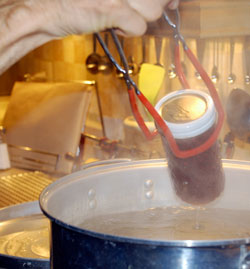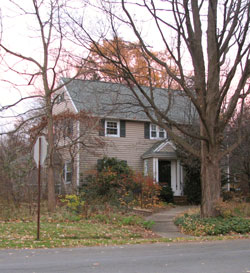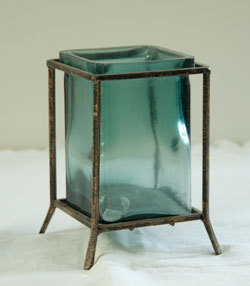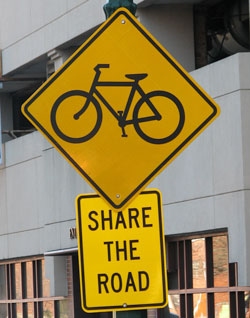Living simply
 ©Janet Allen
©Janet Allen A new appreciation for foliage, not just flowers
When people think of leading a simple life, they may picture a monk living in a tiny room, devoid of all comforts, deliberately choosing to live ascetically. Although this may work for some people, this barren existence isn't what we're thinking of as we design our simple life.
Our goal is to strip away all the unnecessary things—both stuff and activities—so that we have time and energy for the really important things. As the Center for a New American Dream says, "More of what matters," and we add to that "less of what doesn't."
Ironically, I guess, the goal of simplicity is actually to have "more"—but only more of what matters. The trick is to figure out what really matters when daily life is full of so many things tugging us in one direction and another—often prompted by our consumer culture.
Simplicity is NOT the same as easy
 ©Janet Allen
©Janet Allen Not as easy as store-bought jam, but we can use our own organic fruit, and we can use less sugar
Another misconception is that simplicity means having an "easier" life. It's no wonder that people who find the concept of simplicity appealing think of it this way. Many if not most of the people in our society are pushed to the limit, trying to manage very complicated lives. Our society isn't an easy one to live in.
We have rewarding lives, but not perhaps "easy" in the sense of having lots of leisure time all week. Besides the activities described in more detail below, we have many commitments to community organizations and projects. Although these are voluntary on our part, and we have no "boss," we do take these commitments as seriously as we would a job, so we don't necessarily have stress-free, leisure-filled lives.
 ©Janet Allen
©Janet Allen We enjoyed the simple pleasure of watching a cicada in our yard
A guiding principle for us is to prioritize that which fosters life. We're trying to eliminate the parts of our lifestyle that are extraneous to this goal.
As Albert Schweitzer said, we are trying to live with a "reverence for life." This is our prime motivation for being good stewards of our yard (described in more detail in Our Habitat Garden) and for growing much of our own food in Our Edible Garden. We're now trying to carry the same ideas through to the rest of our lives.
The ways we've tried to simplify our lives are described below.
Food
Eating simple food doesn't always mean easy preparation. It takes a while to cook, though we mostly create a fairly simple cuisine—no 15-step recipes for us! But even the simplest cooking means preparing ingredients and having dishes to wash (and only a few of the food preparation dishes are easily washed in the dishwasher).
Still, though, what would a rewarding simple life be without delicious food? And we think our food really is delicious.
Just as important, our food is health-sustaining. Although it's possible to lead a fulfilling life with health challenges, being healthy is the easiest way to have a rewarding life.
Shelter
 ©Janet Allen
©Janet Allen Our house - "not so big" or not?
Simplicity in shelter is something we'll have to work on. Our too-large house is stuffed with too much stuff.
We can take care of too much stuff part, but we won't be moving from our too-big house. Not only have we put too much of ourselves in the house, but it would simply take more time than it's worth to look for another house.
Ultimately, though, the primary reason we won't move is not the house, but our yard. We've worked to create a habitat full of life and an edible garden for growing our food. At our ages, we could not recreate these.
On the positive side, we've been good stewards of our house, maintaining it so it will be a good house for someone in the future, and it was built solidly back in 1938 when they really built houses well.
And although we know we have a "too-big" house, by today's standards, most people wouldn't think of it as being excessively large. It's "too-big" in the sense of being more space than we really need and by representing a size that isn't really sustainable. It's not the size house we'd buy if we were starting over.
Stuff
 ©Janet Allen
©Janet Allen This glass object that holds a tea candle seemed like a good idea at the time…
Stuff is a big barrier that blocks us from living a simpler life. We'll have to bite the bullet and spend some time cleaning it out. Life is so short that I regret spending time dealing with this stuff. What we won't do, though, is throw it all into the trash, which would be the easiest, but also the least responsible way to deal with it all.
On our walks, we see a lot of evidence that this is how most people deal with extra stuff. It's hard to understand why people do that when there are so many people in need who could use those items, perhaps with just a simple repair.
Of course, in our efforts to simplify, not bringing anything new into the house not only simplifies our living space, but also saves time, money, and effort.
Transportation
 ©Janet Allen
©Janet Allen Our society hasn't yet learned how to share the road—or why
It's hard in our society to have simplicity in travel. At this point in history, it's not just the suburbs that are inconvenient and force us into cars for everything we want. Even small- or mid-size cities have become difficult since few of these smaller cities have grocery stores or other necessitities of daily life within safe walking or bicycling distance, and our car-centric society doesn't always accommodate the needs of bicyclists and pedestrians.
Again proving that the simplest way isn't always the easiest way, we do manage to get all our groceries, our library books, and some of our household items and clothing by walking, all within a 3 to 3-1/2 mile round trips. These walks do make getting exercise simpler, though!

